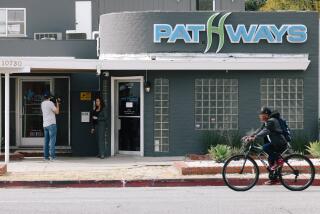Supreme Court Deals a Defeat to Kevorkian : Judiciary: Justices reject claim that Constitution allows doctor-assisted suicides. Authorities are now free to prosecute ‘Dr. Death.’
- Share via
WASHINGTON — The Supreme Court on Monday rejected Dr. Jack Kevorkian’s claim that the Constitution permits doctor-assisted suicides, opening the way for Kevorkian’s prosecution on as many as 10 counts of murder for helping terminally ill patients end their lives.
The retired Michigan pathologist, popularly known as “Dr. Death,” had been charged with murder in the deaths of two patients and with assisting the suicide of three others. Michigan authorities are weighing more charges in light of Monday’s high court action.
The justices refused without comment to hear Kevorkian’s appeal of a 1994 Michigan Supreme Court ruling that the Constitution contains no right to assist another person’s suicide.
Kevorkian, defiant in defeat, said through his attorney that he fully expected the adverse high court ruling and would not be deterred from helping other terminal patients kill themselves.
His attorney, Geoffrey Fieger of Southfield, Mich., said Monday that he expects Michigan county prosecutors to bring murder charges against Kevorkian in as many as 10 assisted-suicide cases.
Since 1990, the retired pathologist has helped 21 people end their lives with lethal injections or carbon monoxide poisoning.
Larry Bunting, chief assistant prosecutor of Oakland County, Mich., where Kevorkian lives and where the doctor carried out most of what he calls “medicides,” said that his legal pursuit of Kevorkian would resume.
“We are going to prosecute him on the murder and assisted-suicide cases and we are reviewing several other cases for possible prosecution,” he said. “Jack Kevorkian flouts the law and in a democracy you cannot ignore someone who willingly violates the law.”
Fieger, who is as outspoken as Kevorkian is controversial, said that the Supreme Court’s refusal to take the case was a mark of cowardice and a “shirking of its duty.” He compared the intelligence of the justices of the Michigan and U.S. Supreme Courts to that of the character Alfalfa of the “Little Rascals” series.
The lawyer said that, despite the ruling (Hobbins vs. Attorney General of Michigan, 94-1473, and Kevorkian vs. Michigan, 94-1490), Kevorkian would continue in selected cases to help dying men and women end their lives. He called euthanasia “the preeminent civil rights issue of the 1990s.”
Kevorkian most recently assisted a suicide in November of last year. “I don’t know of any plans to do one now but if I did I wouldn’t tell you,” Fieger said. Fieger said that the case was not about assisted suicide but about “the right of people not to suffer at the end of life. When death is (the) only alternative to pain, people have a right to choose death.”
The Supreme Court also turned down a separate challenge to Michigan’s ban on assisted suicide filed by two terminally ill cancer patients, a pharmacist and a psychiatrist.
Kevorkian was charged with murder in the deaths of Marjorie Wantz and Sherry Miller in 1991, and with assisting the 1993 suicides of Donald O’Keefe, Merian Frederick and Ali Khalili.
In response, the Michigan Legislature banned assisted suicides in February, 1993, but the law has since expired.
Kevorkian sought dismissal of all five charges against him, winning at the trial-court level. But the Michigan Supreme Court ruled last December that the Constitution does not provide a right to assisted suicide and said that aiding a suicide can be prosecuted as a common crime.
In his appeal to the U.S. Supreme Court, Kevorkian argued that there is a constitutional right to “end intolerable pain, suffering or debilitation” through assisted suicide.
In other actions Monday, the justices:
* Agreed to hear an Iowa case that could spell out the obligations of bankrupt companies to provide health care and retirement benefits for former employees (Varity vs. Howe, 94-1471).
* Let stand a lower-court decision that requires the maker of the purported hair-growing product “Helsinki Formula” to stop making many of its advertising claims and to refund money to consumers (Pantron I Corp. vs. FTC, 94-1451).
* Refused to intervene in the way Florida elects its state and local judges (Nipper vs. Smith, 94-1463). The Clinton Administration joined with black Florida voters in challenging a system that they contend makes it difficult for blacks to win judicial seats.
* Turned down an appeal by the U.S. Forest Service of a ruling that requires the agency to undertake extensive consultation with other agencies before permitting development in federally owned forests (Thomas vs. Pacific Rivers Council, 94-1332). The case involved a plan approved by the Forest Service for logging and road-building in the Wallowa-Whitman and Umatilla forests in Oregon.
More to Read
Sign up for Essential California
The most important California stories and recommendations in your inbox every morning.
You may occasionally receive promotional content from the Los Angeles Times.













